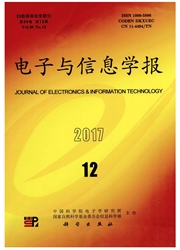

 中文摘要:
中文摘要:
现有相控阵雷达资源调度策略通常没有考虑成像任务的要求,需要分出一部分固定资源实现成像功能。该文将认知成像的思想引入到雷达资源自适应调度中,提出一种基于稀疏孔径认知ISAR成像的雷达资源自适应调度算法,并给出了具体的性能评估指标。在对目标特征进行认知的基础上,根据反馈信息对雷达的时间资源进行自适应调度,能够在对不同目标进行跟踪和搜索的同时实现认知成像,从而显著提高了雷达的工作效率。仿真实验验证了该算法的有效性。
 英文摘要:
英文摘要:
The mission of imaging is usually not considered in existing resource scheduling strategies of phased array radar, and it is required to separate a fixed part of resources for target imaging. In this paper, the concept of cognitive imaging is introduced to the radar resource scheduling strategy, and then a novel adaptive scheduling algorithm is proposed based on sparse-aperture cognitive Inverse Synthetic Aperture Radar (ISAR) imaging. The corresponding performance evaluation indicators of the proposed algorithm are also given. Based on the cognition of targets’ characteristics, the time resource of radar can be allocated adaptively according to the feedback information, and then the cognitive imaging of targets is achieved simultaneously during implementing tracking and searching tasks. As a result, the efficiency of the radar is improved significantly. Simulation results validate the effectiveness of the proposed algorithm.
 同期刊论文项目
同期刊论文项目
 同项目期刊论文
同项目期刊论文
 An Adaptive ISAR-Imaging-Considered Task Scheduling Algorithm for Multi-Function Phased Array Radars
An Adaptive ISAR-Imaging-Considered Task Scheduling Algorithm for Multi-Function Phased Array Radars Micro-Doppler features analysis and extraction of vibrating target in FMCW SAR based on slow time en
Micro-Doppler features analysis and extraction of vibrating target in FMCW SAR based on slow time en 期刊信息
期刊信息
